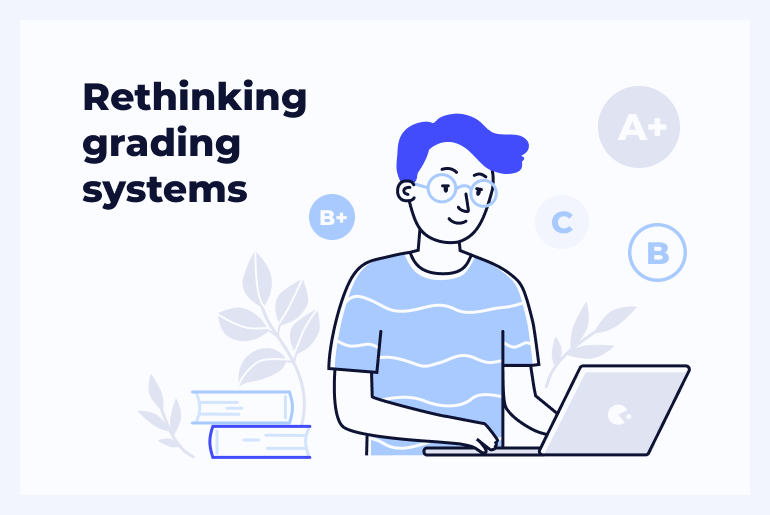Google returns about 2,410,000,000 results for the “new normal in higher education,” which is a clear indication of how vital this question is.
Some are saying that old teaching methods will have to vanish, giving way to the tech-savvy instruction. Some predict tougher competition among higher education institutions as they struggle to grow enrollments and make admissions less demanding.
To help us avoid getting lost in this round-the-clock news stream, we’ve reached out to a highly experienced specialist in making predictions based on demographic, political, and economic data.
Meet Bryan Alexander, Senior Scholar at Georgetown University and author of Academia Next, The Futures of Higher Education.
His research and teaching expertise has also spanned more than 26 years, giving him a unique amount of experience. Bryan Alexander is also famous as a futurist, writer, speaker, and consultant. His blog covers future trends in education, shares good reads as well as some helpful resources for teachers.
In our interview with Bryan, we talked about future changes in admissions, technological challenges in distant teaching, and even emerging tech like artificial intelligence. Here’re the major highlights of our conversation. Read on!
Unicheck: Lately, you’ve shared a bunch of possible scenarios for how the educational world is going to develop. Do you think that the current situation can affect the way people choose professions?
Bryan: We’ve been seeing a shift towards STEM fields. In the European and North American higher education, there has been a move away from the humanities and the arts. That’s been going on for about ten years.
I think COVID-19 will accelerate that move. First, there’ll be more and more interest in all of medicine. I mean, everything from epidemiology to nursing and anesthesiology, but also to psychology, hospital administration, and eldercare. There’s a huge field for that. And then, there’re supporting fields in computer science when it comes to bioinformatics.
Programming is vital when it comes to hospital administration, but also electronic medical records. People will show more interest in studying economics to help rebuild the global economy and, perhaps, politics or political science, depending on how much political upheaval there is.
So, we’ll see people spending more and more time in those fields. One problem is for countries that have different forms of privatized higher education. In Britain, Australia, Canada, and especially the United States, they’ll be suffering financially for different reasons. They will have less money to spend and will be shifting that money towards the first category I mentioned, which means the second category will lose. Overall, there will be a shift towards biology and the life sciences.
Unicheck: How can the admission process be transformed, given that most of the entrance tests have been postponed?
Bryan: Many countries reduce testing alternatives and testing mechanisms. China, for example, canceled a whole series of exams that were mostly aimed at preparing students to study in English-speaking countries, and there are reactions to this.
In California, the California State University system announced that it would no longer require certain tests, making the expectations reduced as a result. I think students will also look for two things that they haven’t really looked for before.
The first is they will look for how the campus will make online life as engaging and rich as possible. So, they may look for academics and for how teaching is done. But they’ll also look for how the campus builds community online. Do they use WhatsApp to organize student groups? Do they have parties online? That kind of thing.
The second thing is if any campus is considering reopening face-to-face instruction, then they will look very, very carefully at how that proceeds. They’ll look at cleaning, social distancing, and testing. Сampuses have never had to explain that before. So, now they have to do a good job of describing it to students.
Think about an 18-year-old who wants to go to university for the first time. They want some of that connection, social life, while other adults—once they see how much they’ll be paying—they might want other benefits as well. Students will be looking for those two things as well as trying to grapple with the changes in the testing regime.
Unicheck: What are the ways to better engage students during distant learning? Many institutions don’t have all the necessary technologies in place, so it’s a huge roadblock for them, but they have to tackle this problem somehow.
Bryan: There is so much involved here. Fortunately, we have been studying this for almost 40 years, so there is a lot of literature and scholarship on how to do this.
We’ve studied this in terms of classes and instruction, but we’ve also studied this in terms of a broader cyberculture.
You know how to maintain a virtual community, how Reddit keeps going, how to do a chat board. That’s the good news. We can draw on that knowledge. And there are all kinds of ways, such as video, that can give a richer presentation humanize us.
That connection is so important. But the flip side of this is that not everybody has access to video because of infrastructure. They might not have the bandwidth; they might not have the hardware. So, there is a problem of justice or equity.
I’ve seen all kinds of interesting solutions. In the United States, we have small, local colleges called community colleges. And I’ve seen stories of college presidents driving a school bus to an area that has bad bandwidth, and the bus has bandwidth built into it. So, they invite everybody to come to the bus and get online. I have heard of very remote colleges and universities where they actually skipped video and the internet completely. And they just print it up, stacks and stacks of readings, workshops, and assignments. Then they carried those to students, so they could work on them and mail them back.
So, on the one hand, technology is powerful, but on the other hand, it’s not universal. In such a case, we may look for alternatives like audio. The sound of the human voice is unique and carries with it so much emotional contact. Recording audio can sometimes be a very powerful way to have that connection. What’s more, audio files are smaller in size than videos, so students may have less trouble downloading them.
For students to feel connected and learn meaningfully, having asynchronous technologies is essential. It can be a discussion board or a virtual learning environment. No matter what it is, it should be meaningful.
Unicheck: Lack of technologies isn’t the only struggle. Instructors have to change the way they have been doing things for years. What other difficulties are they experiencing?
Bryan: Think about changing between teaching a tutorial with three people versus teaching a lecture hall of 400 people. The teacher has to do very, very different things to make that work.
Teaching online is like another one of those modes. And as I was saying before, we have years, decades of information on how to do it well.
Technology may be frightening or unfamiliar. And that’s a serious problem. Instructors need a lot of support from staff to be comfortable. So, they should practice and try the most basic technologies they can use at first.
The second problem is bandwidth or infrastructure issues, so they need support for that too. Another problem may boil down to copy-pasting old habits into a new technology. It takes time to learn new habits based on the new medium. If you look at movies from the 1900s, they looked like stage plays. You have a beautiful set—the actors have lots of makeup like for the theater. But after a while, directors figured out, “Oh, I can move the camera and crosscut these special effects.”
And that’s very exciting. Teachers go through the same process. Running a zoom session will remind them of a face-to-face class. They’ll start doing things that they remember: call on people, ask questions, lecture. After reaching the second stage, they’ll start using a chatbox, different backgrounds, and so on. They have to go through that two-step process to really make that change. And it requires imagination and practice.
Unicheck: You are a true visionary, consulting universities and colleges on the ways to enhance learning and teaching, integrate new teaching methods and technologies. What is your idea of artificial intelligence and its role in education?
Bryan: That’s a huge topic. Artificial intelligence impacts higher education in a few different ways. One of the ways is in the macroeconomic frame. We have to think about whether artificial intelligence will change the jobs that are available. It will require us to reimagine courses of study, certificates, and diplomas.
Secondly, we have to think about to what extent we replace people with software and to what extent we change how people work with software. So, that’s a simple replacement function.
The other is when a teacher uses artificial intelligence to teach. For example, there’s a meteorologist at the University of Michigan who has taught a class for a long time. And now, he has enough data to run software over it and figure out how a student is likely to pass or fail the class. That doesn’t replace the professor but enhances his work.
We have to keep considering those two different options—replacement versus a kind of synthesis.
I have a few favorite AI use cases. One of them is at Georgia Tech and the IBM Watson program. A computer scientist at Georgia Tech wrote a program that would simulate a teaching assistant, and he nicknamed her Jill Watson, but didn’t tell his students that he had done that.
His students interacted with her and thought she was better than other TAs. This was a big story. Now, Georgia Tech has made this part of their strategic plan. They’re wondering where you can have AIs that can do some very basic functions like, “What time is the exam?”, “What pages is the reading” – this kind of thing.
For now, AI can perform those functions. What I get excited by is going beyond that. When AI gets more creative and interacts more deeply with human beings, I think that is where AI becomes very useful and very challenging pedagogically. At the same time, I’m very excited when students get to work with AI and make their own projects. This is a great question, and there are a lot of directions we can go in, but those are a few of my thoughts.




